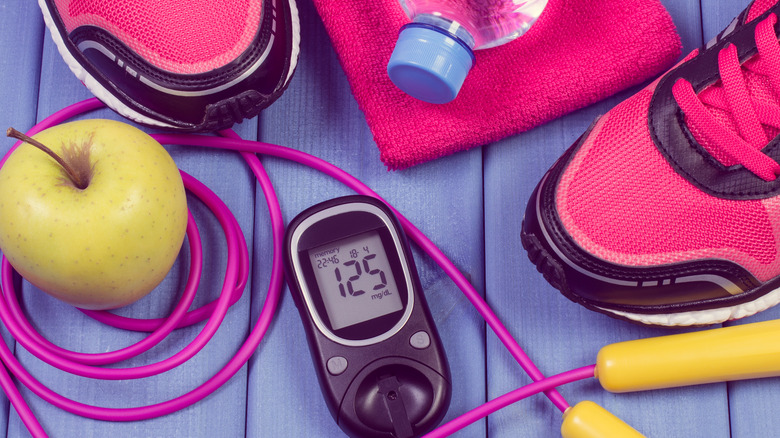How A Low-Carb Diet Helps Prevent Diabetes For Those At Risk
With an estimated 37 million Americans living with diabetes, there's a possibility that you or someone you know has this disease (via CDC). This chronic disease occurs when either the pancreas does not produce enough insulin or the body cannot use the insulin effectively. As a result, diabetics must either take insulin if needed or monitor their blood sugar by eating healthy, exercising regularly, and taking medicine prescribed by their doctor.
Managing diabetes is a difficult task that many Americans wish they weren't burdened by. If you're on the path to becoming diabetic, new research shows that pre-diabetics may be able to lower their blood sugar without medication. By going on a low-carb diet for six months, individuals in the study by Tulane University were able to significantly drop their hemoglobin A1c levels in comparison to the people who ate their typical diet.
Your A1c level, which you can determine with a test, will tell you what amount of your red blood cells have sugar-coated hemoglobin. While diabetics have above 6.5%, pre-diabetics hover between the 5.7%-6.4% range.
What you eat can lower your blood sugar
Any time we ingest carbohydrates, our body works to digest them into sugar that will enter our bloodstream (via Harvard School of Public Health.) When people with diabetes consume too many carbs, their body has trouble regulating the sugar, causing their blood sugar to spike.
By going on a low-carb diet, people at risk for diabetes can decrease the amount of sugar that enters their bloodstream. The diet consists of eating foods such as low-carbohydrate vegetables and fruits, cheeses, nuts, and meats. One of the most common low-carb diets is the Mediterranean diet. Known for its palate of fresh fish and vegetables, low-fat cheeses, plenty of fruits and nuts, and emphasis on herbs and spices rather than salt, the Mediterranean diet is one of the healthiest diets heralded by doctors, per Everyday Health.
With research and patience, removing most carbohydrates from your diet can be a worthwhile effort. Before you change your eating habits, speak with your doctor to ensure that you're taking the right approach to your health.

